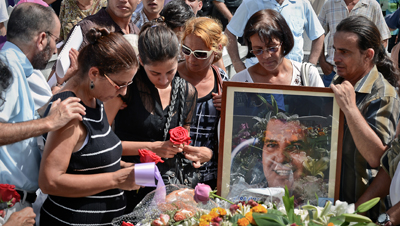A friend delivered the shocking news in a telephone call on Sunday. Oswaldo Payá, an activist and a tireless advocate for freedom of expression, had died in a car accident that afternoon.
Payá, an engineer, had advocated for the release of the 29 journalists imprisoned during the 2003 crackdown known as the Black Spring. He was the 2002 winner of the European Parliament’s Sakharov Prize for Freedom of Thought and also the leader of the Varela Project, a landmark gathering of more than 20,000 signatures petitioning for political and human rights reforms to the government. In 1988, he had founded the Christian Liberation Movement.
Three people were with Payá during the accident. One, Harold Cepero, an activist, died. The others, Ángel Carronero, deputy chairman of the youth wing of the Spanish ruling Popular Party, and Jens Aron Modig, the Swiss chairman of the Christian Democratic Youth League, were injured. The crash occurred at around 1:30 p.m., near the small town of La Gabina, in Granma province, some 800 kilometers (450 miles) from Havana. The cause was unclear.
Shortly after 3 p.m. on Monday, Payá’s body was delivered to the parish in the humble neighborhood of El Cerro, where he had lived as a child and then with his wife and three children. The small church was filled with neighbors, friends, relatives, priests, nuns, Christian Liberation activists, and political dissidents from all over the country. There were moments of great emotion, and the prayers alternated with the national anthem and applause. The service continued until dawn, when the crowd departed for Colon Cemetery, where an emotional burial took place.
There was also a large group of police officers that accompanied the crowd. The local Human Rights and Reconciliation Commission said that 40 activists who were there to pay homage to the 60-year-old leader were arrested after yelling “Freedom!” according to news reports. Most were released a few hours later, the reports said.
Payá’s young children showed great fortitude in the previous three tragic days, and his wife, Ofelita, gave a profound speech about him and the continuation of his work.
The physical absence of the prestigious opposition leader is a painful loss for the peaceful dissident movement, at a time when Cuba is experiencing an acute general crisis due to hardline totalitarian authorities grasping onto their power. Still, Payá’s dedication to the struggle for the rights of all Cubans is a source of inspiration for us. We must continue pushing for the establishment of a democratic society and encourage the development and prosperity of our sovereign nation. Oswaldo Payá will always occupy an important spot in the history of Cuba.
As José Martí said, “Death is not real when one’s life work is fulfilled; turn the thinker’s brain to dust, but the thoughts on which he worked live forever and are fruitful.”
[Reporting from Havana]
